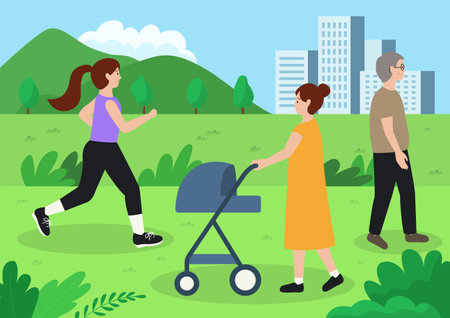Introduction: The Milestone of First Steps in the UK
In Britain, a baby’s first steps are more than just a physical achievement—they are a cherished developmental milestone woven into the fabric of family life and tradition. Parents across the UK eagerly anticipate this moment, often capturing it on video or sharing the news with loved ones over a cuppa or at a family gathering. This milestone symbolises newfound independence for children and marks an emotional turning point for parents as they witness their little one transition from infant to toddler. Culturally, British families may celebrate these first steps with small gatherings, social media posts, or even keepsakes like a pair of “first shoes” from well-known high street shops such as Clarks. These early steps not only evoke pride but also connect generations, as grandparents reminisce about when their own children took those tentative strides. For many British parents, the moment is tinged with nostalgia and hope—a blend of looking back at their own childhoods and forward to their child’s unfolding journey. The table below highlights some common ways families in Britain commemorate this precious milestone:
| Celebration Method | Typical UK Example |
|---|---|
| Sharing with Family | Phone calls, WhatsApp groups, or family Sunday roast announcements |
| Recording the Moment | Videos/photos shared on Facebook or Instagram |
| Keepsakes | Buying traditional first walking shoes (e.g., from Clarks) |
| Storytelling | Grandparents recounting family stories about first steps |
This profound event is not just a rite of passage for the child but also an opportunity for parents to reflect on their evolving role and the joys of nurturing development within the context of British culture.
Developmental Readiness: Signs Your Baby is Preparing to Walk
As your little one nears their first steps, British parents often look for a combination of physical, cognitive, and emotional cues to know when walking might be just around the corner. Understanding these signs can help you support your baby’s unique journey in a way that feels both natural and encouraging within a UK context. Below is a table outlining some of the most common indicators and how families across Britain might notice or chat about them at home or during health visitor check-ins:
| Type of Cue | Typical Signs | British Parent Observations & Expressions |
|---|---|---|
| Physical | Pulling up to stand, cruising along furniture, standing unaided for a few seconds, increased leg strength. | “She’s starting to toddle round the sofa!” “He’s got a right wobble on when he lets go.” |
| Cognitive | Curiosity about moving objects, trying new ways to reach toys, understanding simple instructions like “come here”. | “He’s always plotting his next move.” “She knows exactly where she wants to go now.” |
| Emotional | Showing excitement or pride after standing or taking steps, seeking encouragement or reassurance from familiar adults. | “You should’ve seen her face when she took a step – chuffed as anything!” “He looks for a cheer every time he stands up.” |
British parents often celebrate these moments with understated pride, sharing stories with friends over a cuppa or mentioning milestones in their local playgroup. Noticing these cues means you can provide gentle support—perhaps by rearranging living spaces safely or offering a steady hand when your child is ready. Every baby follows their own path, but recognising these signs helps foster both confidence and connection throughout this magical stage of development.

3. Creating a Safe and Supportive Environment at Home
As your baby prepares for those exciting first steps, making your British home safe and supportive is essential. Every living space in the UK has its quirks—whether it’s a cosy terraced house with narrow hallways, a flat with shared stairwells, or access to a communal or private garden. Here are some practical tips tailored for UK families to help your little one explore safely while encouraging their walking development.
Child-Proofing Essentials for Different British Homes
| Home Type | Key Safety Considerations | Walking Encouragement Tips |
|---|---|---|
| Terraced Houses | Narrow corridors and steep staircases; often limited play space on the ground floor. | Use stair gates at both top and bottom of stairs; clear clutter from hallways to create an obstacle-free path; place non-slip mats on wooden floors. |
| Flats | Shared entrances, potential lift doors, balcony risks, and less outdoor space. | Keep doors to communal areas locked; secure balcony railings; use soft play mats in living areas to cushion falls. |
| Homes with Gardens | Paving stones, uneven grass, potential for sheds/tools, and garden ponds. | Create a designated safe play area with fencing; check for tripping hazards like loose slabs; introduce push toys suitable for outdoor use. |
General Tips for All UK Living Spaces
- Corners & Edges: Fit corner protectors on coffee tables and low units, which are common in British lounges.
- Shoes Off Indoors: Encourage a shoes-off policy to keep floors clean and reduce slips—a popular practice in many UK homes.
- Accessible Furniture: Arrange sofas and chairs so your baby can cruise along them easily, supporting their early steps.
- Warmth & Comfort: Keep rooms warm during chilly British winters but avoid rugs that slip on laminate floors.
- Tidy Up Routine: Make tidying up toys part of your daily routine to keep walking paths clear—an excellent way to teach responsibility alongside mobility skills!
The Importance of Outdoor Exploration
If you have access to a garden or nearby park, take advantage of the fresh air by letting your child practise walking on different surfaces. Grass, paving stones, and even the gentle slopes of British gardens provide valuable sensory feedback and build confidence. Always supervise closely, especially near water features or steps commonly found in traditional UK gardens.
A Nurturing Atmosphere Makes All the Difference
No matter your living situation, babies thrive when they feel secure and encouraged. Cheer them on as they wobble from sofa to armchair or toddle down the hallway. Your positive attention builds their confidence—making those first independent steps truly memorable for you both.
4. Encouragement and Interaction: British Parenting Styles
In Britain, parents often take a balanced and thoughtful approach when supporting their baby’s first steps. The aim is to gently boost the child’s confidence, foster independence, and maintain a sense of safety, all while allowing freedom to explore. Let’s explore how British parenting styles typically shape this important developmental milestone.
Confidence Through Gentle Encouragement
British parents tend to encourage their babies with positive reinforcement rather than pressure. Celebrating small achievements—like pulling up or cruising along furniture—with cheerful praise helps babies feel secure and motivated. Parents may use phrases like “Well done!” or “You’re getting so clever!” in a warm tone, which supports emotional development as well as physical progress.
Fostering Independence While Staying Close
In the UK, there is an emphasis on fostering independence at an early age but always within safe boundaries. Parents often create safe zones at home where babies can practise walking without constant intervention. They might let their child move from one piece of furniture to another while staying nearby for reassurance, thus striking a balance between supervision and giving space.
Balancing Safety and Freedom: Common British Practices
| Safety Measure | Encouraging Independence |
|---|---|
| Using soft mats or rugs on floors | Letting baby explore rooms with minimal obstacles |
| Securing sharp corners and removing hazards | Allowing safe access to different areas for practice |
| Supervising at a distance rather than hovering | Cheering from across the room to motivate walking |
Interactive Play and Social Learning
Another hallmark of British parenting is interactive play. Activities like singing nursery rhymes while encouraging movement (“If You’re Happy and You Know It”) or joining local parent-and-baby groups provide both social interaction and opportunities to practise new skills. These shared experiences not only make learning to walk enjoyable but also help children learn from peers in a supportive environment.
By blending gentle encouragement, structured safety, and interactive play, British parents nurture both the physical abilities and emotional resilience needed for confident walking. This holistic approach supports healthy psychological development while celebrating every wobbly step along the way.
5. Common Challenges and When to Seek Advice
As your baby takes their first wobbly steps, it’s natural for British parents to experience a range of emotions—from excitement to anxiety. While every child develops at their own pace, some common challenges might arise during this period. Below, we address typical concerns, how to handle them, and guidance on when to seek support from health visitors or NHS professionals.
Typical Walking Worries in the UK
| Common Concern | Possible Cause | What Parents Can Do |
|---|---|---|
| Walking late (after 18 months) | Normal variation or family pattern | Offer encouragement, avoid pressure; consult a health visitor if concerned |
| Toe-walking | Exploration phase or muscle tightness | Monitor progress; seek advice if persistent beyond age 2 |
| Frequent falling or clumsiness | Developing balance and coordination | Ensure a safe environment; mention at routine checks if worried |
| Crooked legs (bowlegs/knock-knees) | Common in toddlers learning to walk | Usually resolves with time; consult NHS professionals if severe or accompanied by pain |
When Should British Parents Seek Advice?
- Your baby is not standing with support by 12 months or walking by 18 months
- You notice unusual stiffness, weakness, or asymmetry in their movements
- Your child is persistently toe-walking after age 2
- You have any concerns about pain, injury, or developmental regression
The Role of Health Visitors and the NHS
Health visitors play an essential role in supporting families across the UK. Don’t hesitate to reach out for reassurance or assessment—they are there to help you navigate these early milestones. Likewise, your GP or local NHS walk-in centre can provide further evaluation if needed.
Cultural Note for British Families:
In Britain, it’s common to chat with other parents at playgroups or parks about your child’s development. Remember that children vary widely—what matters most is supporting your baby’s individual journey while knowing when professional advice is appropriate.
6. Celebrating Milestones: Making Those First Steps Special
When your little one finally takes those eagerly awaited first steps, it’s a moment that deserves to be cherished and remembered. In Britain, where traditions and family bonds are woven into the fabric of daily life, celebrating milestones like these can be both meaningful and uniquely British. Here are some heartfelt ideas to make this milestone truly special, drawing on both classic British customs and modern keepsake trends.
Sharing the Joy with Family
British families often value togetherness and close-knit celebrations. Sharing your baby’s achievement with grandparents, aunties, uncles, and godparents can foster a sense of belonging for your child right from the start. Consider hosting a small tea party at home—a classic British way to mark any occasion. Serve up homemade scones or fairy cakes, brew a pot of English breakfast tea, and invite loved ones to witness or relive the excitement through video clips or stories.
Capturing Memories for the Baby Book
Recording milestones is a cherished tradition in many UK households. Here are some ways to capture those first steps for posterity:
| Memory-Keeping Idea | Description | British Twist |
|---|---|---|
| Photo Series | Take a series of photos or a short video as your baby toddles across the living room. | Add a backdrop featuring classic British motifs—like bunting or a Union Jack cushion. |
| Footprint Craft | Create a painted footprint on paper with the date of their first steps. | Frame it with a border in red, white, and blue or display alongside a favourite Beatrix Potter quote. |
| Milestone Cards | Use milestone cards specifically designed for “first steps” moments. | Choose cards illustrated with British icons such as rainboots (wellies) or the London skyline. |
| Baby Book Entry | Write a heartfelt note about how you felt witnessing this big moment. | Mention what song was playing on BBC Radio 2 or if it happened during Sunday roast time! |
Marking the Occasion in True British Style
If you’d like to go beyond keepsakes, consider planting a tree or flower in your garden—a popular British tradition—to symbolise growth and new beginnings. You could also take your child for their first stroll in a local park or green space, perhaps feeding the ducks at the pond or visiting a favourite playground. This not only celebrates their physical development but also connects them to Britain’s love of nature and outdoor life.
However you choose to commemorate your baby’s first steps, remember that these celebrations don’t have to be grand; what matters most is creating memories filled with love, connection, and joy—values that lie at the heart of every British family story.


